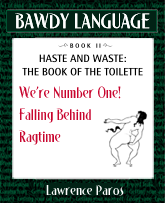Bawdy Language: Book Excerpts
As a public service, to advance the world's awareness and understanding of the origins of curse words, swear words, dirty talk, and sexual slang, and to whet your appetite for more, we offer for your pleasure a page from each chapter. These samplers provide a good sense of the subject matter of each chapter, each of which is self contained. They are cool both for reading and as a gift. Individual chapters can be downloaded at a mere $1.99 each. Such a bargain!
Ragtime: Book II - Haste Makes Waste/ The Toilette 1
The Erotic Tongue
Haste Makes Waste: The Book of the TOILETTE


There is nothing funny about the menstrual period... these are not suitable topics."
— Jackie Gleason (on Norman Lear's decision to treat the issue in All in the Family)

From the masculine perspective, the gentlemen's pleasure garden is out of business, the gate is locked and the key is lost (19thC). In case you still haven't gotten the message, there's no roadmaking today, Leather-Lane and Main Avenue are in a state of no thoroughfare, and the road is up for repairs (mid 19thC). Or as only men could put it, in their usual deft and subtle way, her cherry is in sherry (Swing musicians, 20thC), and her snatch-box is decorated with roses (US Navy, WWII). Computer geeks consider her not user-friendly (1990s).
A Moon for the Misbegotten
We're talking menstruation (c. 1382) here, a simple word meaning both "month" and "moon-change," the two being virtually synonymous. Americans once even spoke of mooning and moontime in that context . In France it's still le moment de la lune. Similar associations also exist in many non-western cultures. On the remote islands off the Northern tip of Australia, the natives believe that menstruation is caused by the moon, who came down to earth in the form of a man to seduce pubescent girls. In New Guinea, they refer to that time of month as mun i killim, "the moon of injury."
The lunar cycle is the source of dozens of expression, one of the more obvious characteristics of menstruation being that it returns every thirty or so days. In tribute to its punctuality, The French call the time, les régles, "the rules." This made for the monthly time, the time, her time of month, and the monthlies, variations of which appear in virtually every Western language, as in Belgium where it is mijn maandstonden, "my monthly moment."
Leave it to the Germans to make the most of their time, referring to it as monatliche botshaft ("monthly message"), monatliche Blüte ("monthly flower"), monatlicher Zoll ("monthly tax"), monatliche Reinigung ("monthly cleaning"), and monatliche Blödigkeit ("monthly stupidity").
215

